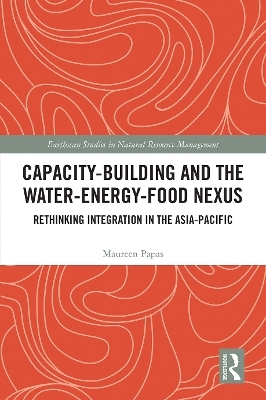
Capacity-Building and the Water-Energy-Food Nexus
Rethinking Integration in the Asia-Pacific
Seiten
2023
Routledge (Verlag)
978-0-367-35629-3 (ISBN)
Routledge (Verlag)
978-0-367-35629-3 (ISBN)
This book looks at whether nexus thinking offers a systematic approach to combat global environmental problems and facilitate enhanced sustainable development.
This book critically explores how the water-energy-food nexus can be used as an organising framework to address environmental degradation and promote sustainable development.
Building effective and sustainable mechanisms to tackle environmental problems requires in-depth understanding of relationships between natural resources, going beyond conventional policy and siloed decision making. The water energy food nexus has been promoted as a conceptual framework and management tool to facilitate integrated planning and practical linkages to support sustainable development. The author opens this book with an overview of capacity building and reviews the significance of the water energy food nexus, bringing in links to the 2030 Agenda. Climate change is highlighted as a key consideration in any conversation about natural resource use and case studies from Japan, India and China are utilised to show that whist long-term sustainable development practices are being implemented the environmental challenges across the region raise concerns about institutional capacity, economic sustainability and future of the region. Finally, through the lens of capacity building, the book suggests that whilst the water energy food nexus may provide a new approach to sustainable development, it will not be enough to achieve long-term sustainability or extend to the lives of those most affected. (This section is unchanged)
This book will be of interest to students, scholars and practitioners working in the water, energy, agriculture sectors and keen to adopt a transdisciplinary approach to public policy, comparative politics and international relations. It will also be a valuable resource to those working in governmental organisations and NGOs involved in capacity building and development.
This book critically explores how the water-energy-food nexus can be used as an organising framework to address environmental degradation and promote sustainable development.
Building effective and sustainable mechanisms to tackle environmental problems requires in-depth understanding of relationships between natural resources, going beyond conventional policy and siloed decision making. The water energy food nexus has been promoted as a conceptual framework and management tool to facilitate integrated planning and practical linkages to support sustainable development. The author opens this book with an overview of capacity building and reviews the significance of the water energy food nexus, bringing in links to the 2030 Agenda. Climate change is highlighted as a key consideration in any conversation about natural resource use and case studies from Japan, India and China are utilised to show that whist long-term sustainable development practices are being implemented the environmental challenges across the region raise concerns about institutional capacity, economic sustainability and future of the region. Finally, through the lens of capacity building, the book suggests that whilst the water energy food nexus may provide a new approach to sustainable development, it will not be enough to achieve long-term sustainability or extend to the lives of those most affected. (This section is unchanged)
This book will be of interest to students, scholars and practitioners working in the water, energy, agriculture sectors and keen to adopt a transdisciplinary approach to public policy, comparative politics and international relations. It will also be a valuable resource to those working in governmental organisations and NGOs involved in capacity building and development.
Maureen Papas is Honorary Research Fellow, Law School at the University of Western Australia.
1. Introduction
2. The water-energy-food nexus: striving to create a pathway to promote integration
3. Looking through a capacity-building lens to understand the WEF nexus
4. Examining the WEF in practice through green transitions: a case study across
India, China and Japan
5. Benefits of nexus thinking to realise the sustainable development goals (SDGs)
6. From theory to practice: the future trajectory of the WEF concept
| Erscheinungsdatum | 28.12.2023 |
|---|---|
| Reihe/Serie | Earthscan Studies in Natural Resource Management |
| Zusatzinfo | 1 Tables, black and white; 7 Line drawings, black and white; 7 Illustrations, black and white |
| Verlagsort | London |
| Sprache | englisch |
| Maße | 156 x 234 mm |
| Gewicht | 453 g |
| Themenwelt | Naturwissenschaften ► Biologie ► Ökologie / Naturschutz |
| Sozialwissenschaften ► Soziologie ► Spezielle Soziologien | |
| Technik | |
| Weitere Fachgebiete ► Land- / Forstwirtschaft / Fischerei | |
| ISBN-10 | 0-367-35629-5 / 0367356295 |
| ISBN-13 | 978-0-367-35629-3 / 9780367356293 |
| Zustand | Neuware |
| Informationen gemäß Produktsicherheitsverordnung (GPSR) | |
| Haben Sie eine Frage zum Produkt? |
Mehr entdecken
aus dem Bereich
aus dem Bereich
Planung · Recht · Verfahren
Buch | Hardcover (2024)
Springer Vieweg (Verlag)
CHF 89,95
Gewinnung - Aufbereitung - Speicherung - Verteilung
Buch | Softcover (2022)
Springer Vieweg (Verlag)
CHF 55,95


